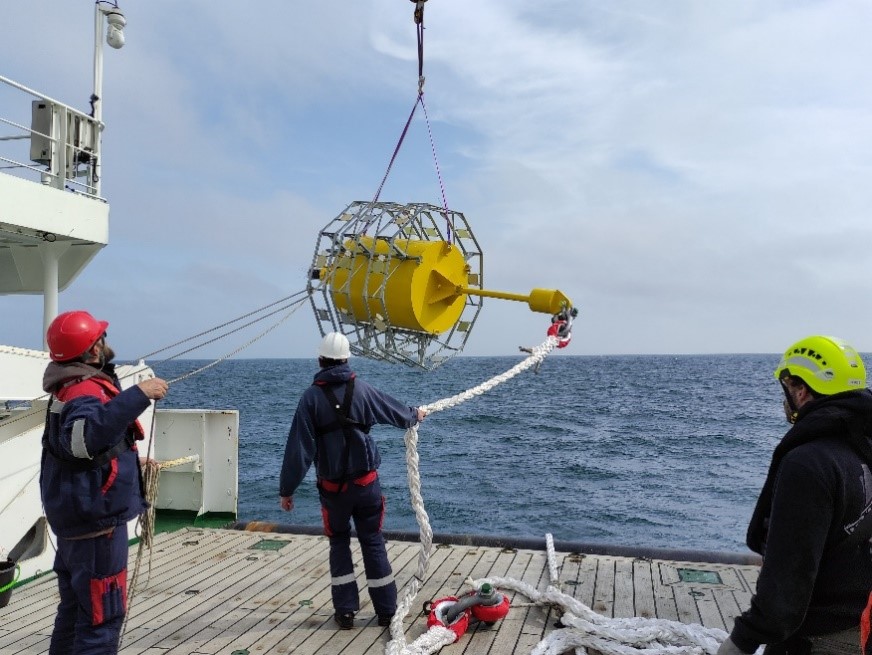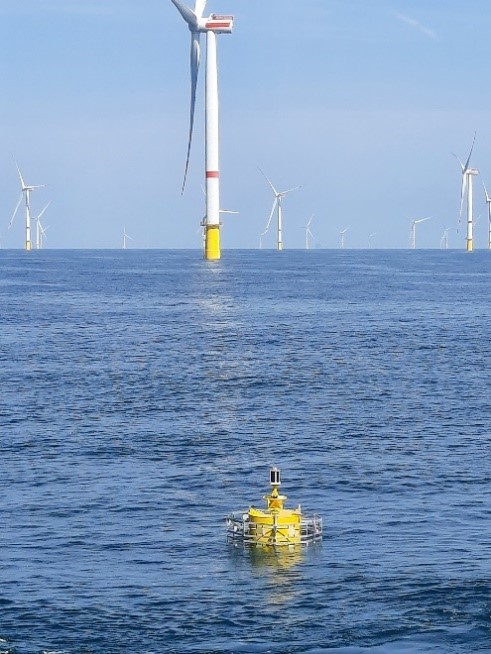
Science and industry join hands to investigate environmental challenges of floating solar at sea

4 July 2023, Brussels, Belgium
To meet our society’s growing need for renewable energy, the potential of offshore solar power generation is being explored today. However, the technology has yet to be further developed, and we must ensure that this is done with respect for the marine environment. In the EcoMPV project, technological developments and environmental research go hand in hand. By working together in this pilot project, science and industry will learn to understand the impact of floating solar panels on the offshore environment and be able to avoid or mitigate their effects as much as possible from the start of potential commercial initiatives. The insights gained will allow positive effects to be immediately reinforced. The installation of three experimental modules at sea was completed on 28 June.
The growing need for the local production of renewable energy and an acceleration of the energy transition, combined with land scarcity, is leading policymakers, industry and scientists to increasingly focus on offshore sites. To date, renewable energy production at sea mainly involves wind farms. Belgium developed into one of the international frontrunners in this field.
Meanwhile, more attention is being paid to emerging opportunities to generate solar power at sea as well. The complementarity of wind and solar technology has been confirmed all over the world. As authorities increasingly promote multi-use of marine space, and the offshore grid infrastructure shows good potential for combined use, the integration of offshore floating solar installations in current and future offshore wind sites presents an opportunity to produce large volumes of additional renewable energy. However, both the technology and the knowledge on environmental impacts of floating solar are still in their infancy.
Environmental challenges
In the project EcoMPV (Eco-designing Marine Photovoltaic Installations), scientists and industrial partners work together to deepen the knowledge about environmental challenges related to offshore floating photovoltaic (PV) installations, aiming at technical solutions to mitigate undesired consequences and maximise beneficial impacts.
Knowledge gaps will be addressed about (1) altered underwater light field, hydrodynamics, pelagic biogeochemistry and primary production, (2) the artificial habitat provision for colonising fauna and fish, and (3) effects on carbon fluxes and sequestration. Furthermore, advice for eco-designing offshore PV installations, paving the way to its environmental licensing, will be formulated.
Preparing for the first floating PV installations
On 24 May, 28 May and 28 June 2023, scientists from the Royal Belgian Institute of Natural Sciences (RBINS) installed three experimental ‘littoral modules’ at the edge of the Mermaid offshore wind farm in the operational Belgian offshore energy zone. These floating modules are equipped with settlement plates in various materials, to study the colonisation potential for marine fauna and the habitat provisioning of artificial floating structures, including offshore floating PV systems.


The modules were designed and developed by Jan De Nul Group in collaboration with RBINS, with support of the EMBRC Belgium (European Marine Biological Resource Centre). The installation was carried out on board the RV Belgica and the Zeetijger, and they will remain in the water for around 1.5 year. The modules will be monitored at regular intervals to follow up the colonization process.
The location for the experimental tests has been chosen to be as similar as possible to the Princess Elisabeth Zone (PEZ), which is designated as a new zone for offshore renewable energy production in the Belgian Marine Spatial Plan 2020-2026. Although the focus of the PEZ remains mainly on offshore wind, seeking combination with floating solar panels seems promising.
Vincent Van Quickenborne, Minister for the North Sea: “With EcoMPV, important steps are being taken to also correctly assess the environmental impact of floating solar panels. This is important. The potential of floating solar panels is estimated to be high. If we want to use them later on a commercial scale, it is necessary to also take into account their effects on the marine environment in order to avoid or mitigate them as much as possible. With this, Belgium once again shows that economy and ecology go hand in hand.”
Tinne Van der Straeten, Minister for Energy: “In our country, we have the brainpower and the will to work out solutions to the challenges of the future. With the Energy Transition Fund, we want to kick-start those solutions. The federal government is supporting 21 top projects including EcoMPV. Floating solar panels at sea are part of the solution to make our North Sea the largest green power plant in Europe. EcoMPV shows once again that we can count on Belgian know-how and expertise for those solutions.”
About EcoMPV
EcoMPV is financed by the Energy Transition Fund of the FPS Economy, AD Energy, started in November 2022 and will run for three years. The project is coordinated by the research team ‘Marine Ecology and Management’ of the Royal Belgian Institute of Natural Sciences (RBINS), with Ghent University as a scientific partner and Tractebel, Jan De Nul Group and DEME Group as industrial partners.
The objectives of EcoMPV are the following:
- Increase the knowledge on the effects of floating PV structures on hydrodynamics and phytoplankton productivity;
- Investigate the habitat provision by floating structures to marine life, including colonising fauna and attraction by fish;
- Describe effects of colonising fauna (fouling) of floating structures on the surrounding sediments, including the burial and sequestration (storage) of carbon in sediments;
- Provide input on the Nature-inclusive design of floating PV systems, based on the results of the previous objectives, as to ensure the environmental sustainability of these systems.
The Energy Transition Fund saw the light of day in 2017, aiming to support energy transition research, development and innovation. A total of 51 proposals were received following the November 2022 project call. Of these, 21 were selected to be considered for grants. Through the fund, the expertise of companies and start-ups will be tapped to accelerate the energy transition.